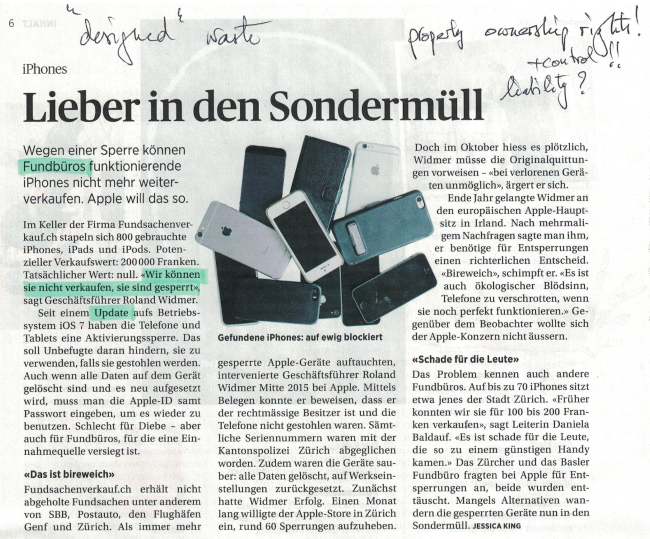A new EU research programme -- Critical Raw Materials Closed Loop Recovery -- is to invest in trials to demonstrate innovative new methods for the collection and reprocessing of waste electronic and electrical equipment (WEEE), hopefully leading to increased recovery of critical raw materials.
Fostering research is great, but should policymakers not also fight abusive behaviour, such as deliberate waste? Fighting planned obsolescence, defined as consumer products suffering a defect shortly after their warranty period has ended, has become popular in Europe, even if it is difficult to prove.
But what about the madness of service-life abortion by OEMs, which results in direct resource loss and is easier to prove?
It appears that in a 2015 update of its iOS 7 operating software, Apple introduced a blocking mechanism to prevent “unauthorised” people from using i-phones and i-pads. Even if all data has been deleted and the default options reinstalled, the product can only be restarted using the original Apple-ID and password.
Lost and Found offices—such as http://fundsachenverkauf.ch/, receiving all objects left behind in Swiss public transport and airports—have in the past checked that the objects had not been announced as stolen and then sold them at a reduced price for reuse, as is practice for all “found and not reclaimed” objects of value in working order, such as children prams, umbrellas and musical instruments.*
As Apple refuses to de-block these products, they now have to be recycled as electronic waste (WEEE, the subject of the new EU research programme). Not only is this a waste of scarce resources which could be prevented, it also increases the cost of a public service—the Swiss Lost and Found office quoted stores 800 used iPhones, iPads and iPods with a potential sales value of CHF 200’000, which it cannot sell. Apple’s refusal also violates a key principle of the industrial economy: at the Point of Sale, ownership and liability are passed to the buyer.
Apple here retains a quasi-ownership of its products, which it had sold to a buyer at the full price. By abandoning his or her property, the buyer passes the integral ownership rights to an unknown finder-keeper who in turn can sell it to whoever wants to buy it, as any second-hand or pre-owned object. This increases overall welfare and reduces electronic waste and its cost.
Reuse before recycling has been an objective of the 2008 EU Waste Directive, and has been reconfirmed in the “Circular Economy Package to help European businesses and consumers to make the transition to a stronger and more circular economy where resources are used in a more sustainable way” of the European Commission, published on 2 December 2015.
Where are the policymakers to enforcr the waste prevention objective of the environmental law in practice?
Walter R. Stahel
Mitglied der Verbraucherkommission Baden-Württemberg,
welche Nachhaltigkeit definiert als Optimierung des Güterbestandes und des Humankapitals
______________________
*Source: Beobachter, 12/2016, Zürich, page 6.






